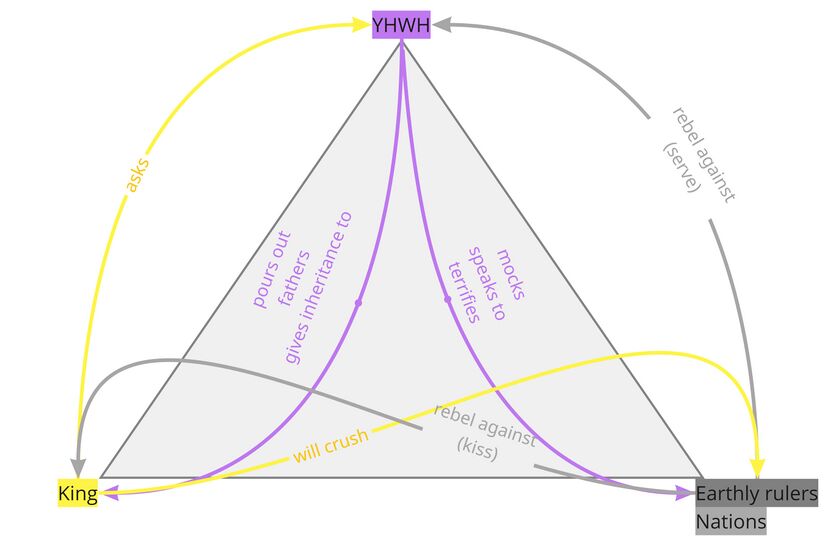Psalm 2 Participant Analysis
From Psalms: Layer by Layer
Psalm 2/Participant Analysis
Choose a PsalmNavigate Psalm 2
Guardian: Ryan Sikes
Participant Analysis
Participant Analysis focuses on the characters in the psalm and asks, “Who are the main participants (or characters) in this psalm, and what are they saying or doing? It is often helpful for understanding literary structure, speaker identification, etc.
For a detailed explanation of our method, see the Participant Analysis Creator Guidelines.
There are 4 participants/characters in Psalm 2:
Profile List
| Nations |
| "Peoples" (v. 1) |
| "Ends of the earth" (v. 8) |
| Earthly kings & nations |
| Earthly kings |
| "Rulers" (v. 2) |
| "Kings" (v. 10) |
| "Earthly rulers" (v. 10) |
| YHWH |
| "The one enthroned in the heavens" (v. 4) |
| "The Lord" (v. 4) |
| YHWH & YHWH's king |
| King |
| "YHWH's anointed" (v. 2) |
| "YHWH's king" (v. 6) |
| "YHWH's son" (vv. 7, 12) |
| Those who take refuge in the king |
Profile Notes
- YHWH is the "Lord" (v. 4) over all the earth, "the one enthroned in the heavens" (v. 4a) as the highest king.
- YHWH, the heavenly king, does not rule over the nations directly. Rather, his rule is mediated by his anointed one (v. 2c), the king whom he placed as his image on Mt. Zion (v. 6), his only son and heir (vv. 7-9).
- The nations rightfully belong to the king, who rules over them like an emperor rules over the various domains in his empire. When Psalm 2 begins, however, the nations are "in an uproar" (v.1a), trying to throw off the shackles of YHWH and his anointed one (v. 3). Specifically, the earthly kings who rule the nations (vv. 2, 10) want to gain independence from YHWH and his king. Instead of being part of the king's empire and submitting to his rule, they want to govern themselves.
- Those who take refuge in the king are those who have gladly submitted to his rule and, therefore, will experience all of the benefits of living under a good king: peace, justice, and prosperity.
| Hebrew | Verse | English |
|---|---|---|
| לָ֭מָּה רָגְשׁ֣וּ גוֹיִ֑ם | 1a | Why are nations in an uproar, |
| וּ֝לְאֻמִּ֗ים יֶהְגּוּ־רִֽיק׃ | 1b | and [why] do peoples plot emptiness? |
| יִ֥תְיַצְּב֨וּ ׀ מַלְכֵי־אֶ֗רֶץ | 2a | [Why] do earthly kings take a stand |
| וְרוֹזְנִ֥ים נֽוֹסְדוּ־יָ֑חַד | 2b | and [why] have rulers conspired together |
| עַל־יְ֝הוָה וְעַל־מְשִׁיחֽוֹ׃ | 2c | against YHWH and against his anointed one? |
| נְֽ֭נַתְּקָה אֶת־מֽוֹסְרוֹתֵ֑ימוֹ | 3a | "Let's tear off their bonds |
| וְנַשְׁלִ֖יכָה מִמֶּ֣נּוּ עֲבֹתֵֽימוֹ׃ | 3b | and throw their ropes away from us!" |
| יוֹשֵׁ֣ב בַּשָּׁמַ֣יִם יִשְׂחָ֑ק | 4a | The one enthroned in the heavens laughs. |
| אֲ֝דֹנָ֗י יִלְעַג־לָֽמוֹ׃ | 4b | The Lord mocks them. |
| אָ֤ז יְדַבֵּ֣ר אֵלֵ֣ימוֹ בְאַפּ֑וֹ | 5a | Then he speaks to them in his anger |
| וּֽבַחֲרוֹנ֥וֹ יְבַהֲלֵֽמוֹ׃ | 5b | and terrifies them in his wrath. |
| וַ֭אֲנִי נָסַ֣כְתִּי מַלְכִּ֑י | 6a | "But I have poured out my king |
| עַל־צִ֝יּ֗וֹן הַר־קָדְשִֽׁי׃ | 6b | on Zion, my holy mountain." |
| אֲסַפְּרָ֗ה אֶֽ֫ל חֹ֥ק | 7a | I will tell about the decree; |
| יְֽהוָ֗ה אָמַ֘ר אֵלַ֥י בְּנִ֥י אַ֑תָּה | 7b | YHWH said to me, "You are my son. |
| אֲ֝נִ֗י הַיּ֥וֹם יְלִדְתִּֽיךָ׃ | 7c | I hereby father you today. |
| שְׁאַ֤ל מִמֶּ֗נִּי וְאֶתְּנָ֣ה ג֭וֹיִם נַחֲלָתֶ֑ךָ | 8a | Ask me, and I will make nations your inheritance |
| וַ֝אֲחֻזָּתְךָ֗ אַפְסֵי־אָֽרֶץ׃ | 8b | and the ends of the earth your property. |
| תְּ֭רֹעֵם בְּשֵׁ֣בֶט בַּרְזֶ֑ל | 9a | You will crush them with an iron scepter. |
| כִּכְלִ֖י יוֹצֵ֣ר תְּנַפְּצֵֽם׃ | 9b | You will smash them like clay pottery." |
| וְ֭עַתָּה מְלָכִ֣ים הַשְׂכִּ֑ילוּ | 10a | And now, kings, wise up! |
| הִ֝וָּסְר֗וּ שֹׁ֣פְטֵי אָֽרֶץ׃ | 10b | Accept discipline, earthly rulers! |
| עִבְד֣וּ אֶת־יְהוָ֣ה בְּיִרְאָ֑ה | 11a | Serve YHWH with fear |
| וְ֝גִ֗ילוּ בִּרְעָדָֽה׃ | 11b | and rejoice with trembling! |
| נַשְּׁקוּ־בַ֡ר פֶּן־יֶאֱנַ֤ף ׀ | 12a | Kiss the son, or else he will become angry |
| וְתֹ֬אבְדוּ דֶ֗רֶךְ | 12b | and you will perish in your way, |
| כִּֽי־יִבְעַ֣ר כִּמְעַ֣ט אַפּ֑וֹ | 12c | for his anger quickly ignites. |
| אַ֝שְׁרֵ֗י כָּל־ח֥וֹסֵי בֽוֹ׃ | 12d | Happy are all who take refuge in him! |
Notes
vv. 1-6, 10-12: Who is the primary speaker?
- In v. 7, the first-person "I" is clearly the king. For this reason, some argue that the king is probably the speaker in the rest of the psalm as well. For example, Eaton writes, "There seems no cause to assume... any change of speaker in the psalm. With Gunkel and Mowinkcel (GT), therefore, we should consider the Davidic king as the speaker throughout, referring to himself in the third as well as the first person."[1]
- But there are at least two problems with this view.
- (1) There is nothing in vv. 1-6 itself to suggest that the king is the primary speaker. Thus, even if he is the speaker in these verses, this does not become clear until v. 7. Someone reading or hearing the psalm for the first time would not likely identify the speaker of vv. 1-6 as the king.
- (2) Outside of vv. 7-9, the king is consistently referred to in the third person (v. 2: "his anointed," v. 12: "the son... he become angry... his anger... in him"). In biblical Hebrew, speakers will sometimes refer to themselves in third person, so the use of the third-person does not necessarily mean that the king is not the speaker. But the fact that the third person is used consistently and exclusively for the king in vv. 1-6, 10-12, suggests that the king is not the speaker in these verses.
- For these reasons, others think that in v. 7 "a new speaker is now abruptly introduced, namely, the king of v. 6. Such alternations in speech are common in the Song of Songs and in other poetic Scriptures."[2] We would agree with this interpretation and thus, for the most part, with Craigie's summary: "Although it is possible that the whole psalm should be viewed as containing the words spoken by the Davidic king..., it is perhaps better to note the change of speakers throughout the psalm. From a literary perspective, the psalmist or poet presents a variety of persons, each of whom speaks. First, he presents foreign nations and kings (2:1-2) who speak their words of arrogance (2:3). Second, he presents the Lord (2:4-5) who speaks concerning the chosen king (2:6). Third he presents the words of the king, who in turn proclaims the divine words of royal proclamation (2:7-9). Fourth, he addresses his own words of advice to the foreign nations and their rulers. Thus, the whole psalm has a dramatic character."[3] The only minor change we would make to Craigie's summary is that the psalmist does not present the king as the speaker in v. 7; rather, the king becomes the main speaker at this point in the psalm. In this sense, the psalm is polyphonic, like Ps 118 (see notes there).
v. 12: YHWH or the king?
- The subject of the verb "become angry" in v. 12 is ambiguous, and so is the antecedent of the pronouns in the phrases "his anger" and "those who take refuge in him." Are these third-person references to YHWH or to the king?
- If we are correct that בַר in v. 12 means "son" (The Text and Meaning of Psalm2:12a), then the king is the participant most recently mentioned and thus the most likely candidate for the 3ms verb and pronoun in the subsequent clauses. "Kiss the son, or else he will become angry..."[4] Furthermore, v. 9 has already said that it is the son who will crush the nations with an iron scepter.[5]
- Nevertheless, even those who agree that בַר means "son" have argued that the 3ms verbs and pronouns in v. 12 refer to YHWH. E.g., Ibn Ezra commenting on יאנף: "It returns to [YHWH] who was mentioned in the previous verse." One argument for this view is that the verb יאנף elsewhere refers exclusively to divine anger.[6] Another argument is that the pronoun in the phrase "all who take refuge in him" most naturally refers to YHWH.[7] Also, the same phrase "his anger" occurs in v. 5 where it refers to YHWH's anger. (Note also that LXX explicitly identifies the subject of the 3ms verb in v. 12 as "the Lord" [κύριος].)
- But the application of divine attributes to the king makes sense in this context where the king is described as YHWH's son, for sons are the image and likeness of their fathers (cf. Gen 5:3; cf. the image metaphor in Ps 2:6). Psalm 110 ends with a similar blurring of the identities of God and king.[8] Thus, there is no good reason not to take the son, who was the most recently mentioned participant, as the referent of the 3ms language in v. 12.
Participant Relations Diagram
The relationships among the participants may be abstracted and summarized as follows:
Participant Analysis Summary Distribution
This resource is forthcoming.
- ↑ Eaton 1975, 111.
- ↑ Poole, 1678, 493, citing Gejerus; cf. Baethgen 1904, 6; for an example of unmarked speaker-shifts in the Psalms, see esp. Ps 118.
- ↑ Craigie 1983, 65; cf. Hossfeld and Zenger 1993, 49, although they see the king as the speaker in vv. 10-12.
- ↑ So e.g., Cocceius, cited in Poole 1678, 500.
- ↑ Cf. Hengstenberg 1849, 49.
- ↑ Cf. Baethgen 1904, 7.
- ↑ Cf. Hupfeld 1855, 33.
- ↑ See The Subject(s) in Psalm 110:5-7; on deliberate ambiguity in the Psalter, see Raabe 1991.



